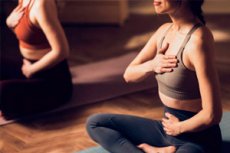New publications
Yoga, Tai Chi, Walking and Running May Be the Best Exercises for Insomnia
Last reviewed: 27.07.2025

All iLive content is medically reviewed or fact checked to ensure as much factual accuracy as possible.
We have strict sourcing guidelines and only link to reputable media sites, academic research institutions and, whenever possible, medically peer reviewed studies. Note that the numbers in parentheses ([1], [2], etc.) are clickable links to these studies.
If you feel that any of our content is inaccurate, out-of-date, or otherwise questionable, please select it and press Ctrl + Enter.

Yoga, tai chi, walking and jogging may be the best forms of physical activity for improving sleep quality and relieving insomnia symptoms, according to a comparative analysis of pooled data published in the online journal BMJ Evidence Based Medicine.
The results support the effectiveness of exercise as a primary treatment strategy for sleep disorders, the researchers note.
Insomnia, characterized by difficulty falling and staying asleep and early awakenings, affects 4–22% of the population and is associated with an increased risk of various mental and physical illnesses, including dementia and cardiovascular disease.
Medications used to treat insomnia can cause side effects, and cognitive behavioural therapy (CBT), although effective, is not always available due to a shortage of trained professionals, the authors explain.
A growing body of evidence supports the benefits of exercise, but current guidelines do not specify which types of activity are most beneficial. To fill this knowledge gap and help patients choose the right type of activity to combat insomnia, the researchers conducted a meta-analysis.
They analyzed databases and identified 22 randomized clinical trials involving 1,348 people and 13 different insomnia treatment approaches, seven of which were exercise-based: yoga, tai chi, walking/jogging, aerobic and resistance training, resistance training only, aerobic exercise combined with therapy, and mixed aerobic training.
Programs lasted from 4 to 26 weeks. Other approaches included CBT, sleep hygiene, Ayurveda, acupuncture/massage, no intervention, or standard care.
Key findings:
- Yoga increased sleep duration by nearly 2 hours, improved sleep efficiency by 15%, and reduced wake time after falling asleep by nearly an hour.
- Walking and jogging resulted in a significant reduction in insomnia severity by almost 10 points.
- Tai Chi improved sleep quality, increased sleep duration by more than 50 minutes, and reduced sleep onset time by 25 minutes. This activity showed the best results of all interventions and the effects were maintained for up to two years.
Researchers believe that yoga, with its emphasis on body awareness and breathing, may reduce anxiety and depression that interfere with sleep. Tai Chi promotes relaxation, reduces sympathetic nervous system activity, and promotes emotional regulation. Walking and running may improve sleep by increasing energy expenditure, regulating cortisol, increasing melatonin production, and deepening deep sleep.
Although most studies had methodological flaws, the authors conclude:
"The results highlight the therapeutic potential of exercise in the treatment of insomnia and allow it to be considered as a complete treatment modality rather than just an adjunct."
They also note that different types of exercise may have different effects on individual insomnia symptoms, and this requires further study.
